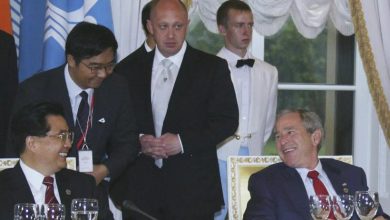Unveiling the Truth: Are GRU Officers Petrov and Boshirov Real Super-Agents, Like James Bond?

Secret agents have long captured our imagination, with fictional characters like James Bond embodying the thrilling world of espionage. However, in the real world, there are individuals who operate behind the scenes, carrying out covert missions and gathering intelligence. One such case that has sparked immense curiosity is that of GRU officers Petrov and Boshirov, known for their alleged involvement in the Salisbury incident. In this article, we delve into their story, exploring the question of whether they are real-life super-agents akin to James Bond or simply products of speculation.
Petrov and Boshirov’s activities have ignited debates and fascination worldwide, as the line between reality and fiction blurs. We examine their connection to the Salisbury incident, explore the training and skills of GRU officers, and delve into the intricacies of real intelligence work. By separating fact from fiction, we aim to shed light on the true nature of their capabilities and operations, providing a comprehensive understanding of the world of intelligence beyond the silver screen.
Key Takeaways
- Petrov and Boshirov are GRU officers who gained global attention due to their alleged involvement in the Salisbury incident.
- Real intelligence work differs from fictional portrayals like James Bond, relying on collaboration, specialization, and strategic planning.
- GRU officers undergo rigorous training encompassing intelligence analysis, combat skills, language proficiency, and more.
- The full extent of Petrov and Boshirov’s abilities and operations remains shrouded in secrecy, as intelligence agencies prioritize operational security and confidentiality.
GRU Officers Petrov and Boshirov: The Controversial Figures
In September 2018, the world witnessed a shocking incident in Salisbury, England. Sergei Skripal, a former Russian spy, and his daughter Yulia were poisoned with a nerve agent. The United Kingdom’s investigation pointed to the involvement of two individuals, Alexander Petrov and Ruslan Boshirov, who were later identified as GRU (Russian military intelligence) officers. This revelation sparked widespread curiosity about their true identities and capabilities.
The James Bond Connection
James Bond, a fictional character created by author Ian Fleming, is often portrayed as the epitome of a super-agent. Known for his charm, resourcefulness, and mastery of espionage, Bond has become an icon in popular culture. Comparisons between Petrov, Boshirov, and Bond arise due to their involvement in high-profile operations and the aura of mystery surrounding their activities.
Petrov and Boshirov: The Salisbury Incident
The Salisbury incident catapulted Petrov and Boshirov into the global spotlight. The UK investigation concluded that they were responsible for the poisoning, alleging the use of Novichok, a deadly nerve agent. Despite the evidence against them, Petrov and Boshirov claimed to be innocent tourists visiting Salisbury to admire its famous cathedral. This contradictory narrative only fueled speculation and intensified the intrigue surrounding their true identities.
The Spy Game: Fact or Fiction?
While Petrov and Boshirov’s actions may seem reminiscent of a thrilling spy novel, it is crucial to separate fact from fiction. The world of real intelligence operations is complex and often far from the Hollywood portrayals we’re accustomed to. GRU officers, like those from other intelligence agencies, primarily focus on clandestine activities such as gathering information, conducting surveillance, and influencing geopolitical affairs.
The Training and Skills of GRU Officers
GRU officers undergo extensive training to prepare them for their covert missions. Their training encompasses a range of skills, including intelligence analysis, cryptography, surveillance techniques, combat training, and language proficiency. The objective is to create adaptable operatives capable of navigating diverse environments and executing missions with precision.
Petrov and Boshirov: Skillset and Operations
The true extent of Petrov and Boshirov’s skills and operations remains shrouded in secrecy. GRU officers are adept at blending into their surroundings, assuming multiple identities, and operating under deep cover. Their training enables them to handle sophisticated equipment, gather intelligence from various sources, and execute covert missions on foreign soil.
The Reality of Super-Agents
While Petrov and Boshirov may have been involved in a high-profile operation, it is important to note that real-life super-agents like James Bond are rare. The world of intelligence work is a collaborative effort, relying on teams of professionals with specialized skills. Rather than a single individual embodying the role of a super-agent, successful intelligence operations depend on coordination, information sharing, and strategic planning.
FAQ:
1. Are Petrov and Boshirov real GRU officers?
Yes, Petrov and Boshirov have been identified as GRU officers by the United Kingdom’s investigation into the Salisbury incident. The UK authorities presented evidence linking their activities to the poisoning of Sergei Skripal and his daughter. Despite their initial claims of being innocent tourists, the investigation concluded that they were indeed operatives of the Russian military intelligence agency.
2. How are GRU officers trained?
GRU officers undergo rigorous training to equip them with the necessary skills for intelligence operations. Their training encompasses a wide range of areas, including intelligence analysis, cryptography, surveillance techniques, combat training, and language proficiency. The objective is to create versatile operatives capable of adapting to different environments and executing missions effectively. While the specifics of their training remain classified, it is known that GRU officers undergo a demanding and comprehensive program to develop their expertise.
3. Do GRU officers like Petrov and Boshirov engage in espionage?
Yes, espionage is a fundamental aspect of the work conducted by GRU officers and other intelligence agencies worldwide. GRU officers gather intelligence from various sources, including human assets, technical means, and open-source information. They analyze and assess the collected data to provide insights into geopolitical affairs, foreign military capabilities, and potential threats to national security. Espionage plays a crucial role in shaping the decision-making processes of governments and ensuring the safety and interests of their respective nations.
4. Are GRU officers like Petrov and Boshirov similar to James Bond?
While the popular image of James Bond may evoke similarities with the world of intelligence work, it is important to recognize the distinctions between fiction and reality. GRU officers, including Petrov and Boshirov, operate within a complex framework of international relations and intelligence gathering. Unlike the singular portrayal of a super-agent like James Bond, real-life intelligence operations involve a collaborative effort, with teams of professionals specializing in various aspects of intelligence gathering and analysis.
5. What is the primary focus of GRU officers?
The primary focus of GRU officers, like those in other intelligence agencies, is to gather information and provide actionable intelligence to their respective governments. They monitor and analyze geopolitical developments, track the activities of foreign entities, and assess potential threats. GRU officers also play a role in shaping and implementing strategies to safeguard national security and advance their country’s interests.
6. How do GRU officers operate undercover?
GRU officers are trained to operate under deep cover, assuming multiple identities to conceal their true affiliation and objectives. They may operate abroad as businessmen, diplomats, journalists, or other roles that provide a plausible cover for their activities. Deep cover operations involve building relationships and networks within target countries, gathering intelligence discreetly, and maintaining operational security to avoid detection.
7. Can GRU officers carry out assassinations?
While it is known that intelligence agencies engage in covert activities, including targeted operations, the specifics of such actions are often classified. GRU officers, like other intelligence operatives, may be involved in missions that include neutralizing threats to national security. However, the details of specific cases and the extent of their involvement remain undisclosed to the public.
8. What are some key differences between real intelligence work and fictional portrayals like James Bond?
Real intelligence work differs significantly from fictional portrayals. Unlike the glamorous and action-packed world of James Bond, real intelligence operations focus on information gathering, analysis, and the subtle manipulation of geopolitical affairs. Successful intelligence work relies on meticulous planning, collaboration, and coordination among teams of professionals with specialized skills, rather than relying solely on the actions of a single super-agent.
9. How do GRU officers ensure their safety during operations?
GRU officers prioritize operational security to protect their identities and ensure their safety during missions. They employ various techniques, such as using encrypted communication channels, practicing counter-surveillance measures, employing disguise and deception, and relying on secure operational protocols. These precautions help minimize the risks associated with intelligence operations and protect the officers involved.
10. Will we ever know the full truth about Petrov and Boshirov?
The full truth about Petrov and Boshirov may never be revealed to the public. Intelligence agencies operate under a shroud of secrecy, protecting classified information and sources. While some details may surface through investigations or leaks, the true extent of their activities and capabilities will likely remain hidden from public scrutiny. The nature of intelligence work necessitates confidentiality to maintain operational effectiveness and safeguard national security interests.
Conclusion
In the realm of intelligence work, the truth often remains elusive to the public. Petrov and Boshirov’s status as real super-agents akin to James Bond may forever be subject to speculation and conjecture. While their involvement in the Salisbury incident showcased elements of covert operations, it is crucial to distinguish between reality and the world of fictional narratives. True intelligence work relies on the collective efforts of teams with specialized skills, rather than an individual embodying the role of a super-agent.
As we navigate the complexities of intelligence agencies and their clandestine activities, it is important to recognize that the portrayal of secret agents in popular culture does not always align with reality. While the enigma surrounding Petrov and Boshirov may persist, understanding the nuances of real intelligence work allows us to appreciate the true nature of their roles and the challenges faced by those who operate in the shadows.








